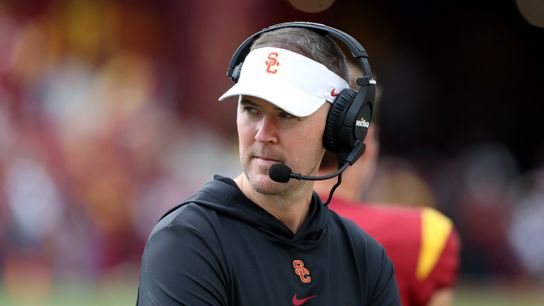When the pandemic hit, recruiting visits were the first thing to go. The NCAA first enacted a COVID-induced dead period on March 13, lasting through April 15. Then it was extended through May 31. Then through June 30.
All of this made sense. In a public health crises, it wasn't a good idea to ask players and their families to travel to your place, or to put coaches on the road to visit numerous schools and homes.
This was all understandable and easy (well, easy-ish) for coaches to swallow, because at the time Signing Day was still off in the future.
However, last week the NCAA officially extended the ongoing dead period through the end of 2020.
"The Council has been reviewing the dead period on a regular basis since April," the NCAA said in a statement. "A dead period precludes all in-person recruiting. Phone calls and correspondence can continue to occur.
"Members also adopted emergency legislation prohibiting schools from giving complimentary game tickets to prospective student-athletes and their high school or two-year college coaches during the dead period.
"While the Council acknowledged and appreciates the growing desire to resume in-person recruiting by select coaches’ associations, Council members ultimately concluded the primary concern right now must be protecting the current student-athletes on our campuses," Penn AD and Division I Council chair M. Grace Calhoun added. "We encourage our coaches to interact with prospective student-athletes virtually in this time period."
While everyone has known since March of the possibility that Class of 2021 recruits could sign in December with schools they've never visited and coaches whose hands they've never shaken, that hypothetical is now a reality.
Asked about the move by Sooner Scoop's Bob Przybylo, Lincoln Riley said he was "shocked."
Sitting in the NCAA's chair, it's understandable how and why they came to this decision.
We now know enough about the virus and the timeline of wide-spread testing and vaccines to say that safe, rampant travel is not realistic and won't be for the remainder of the year. We can all make informed decisions about the risk level of traveling on a case-by-case basis... but as a matter of national policy, it's hard to see the NCAA recommending schools bring recruits and their families to campuses, or recommending schools send coaches out on the road.
Seriously, try to game out how an official visit weekend would go in 2020. Even if a Power 5 school happens to have enough rapid tests to spare on dozens of recruits plus their parents, what happens when one of those guests tests positive? Do you send them home, thereby knowingly putting a COVID-positive individual in contact with other travelers? Do you isolate them in a hotel room near campus for two weeks?
Considering all the heavy lifting schools are doing just to get their own athletes back into competition, it's no wonder the NCAA isn't in favor of adding in-person recruiting to that burden.
At the same time, it's easy to see why Riley and other coaches are miffed by the decision. The 2021 recruiting class will form the backbone of their teams in 2023, '24 and '25. The pandemic will be a thing of the past by then, but these coaching staffs will still be living with the consequences every day. No one in 2024 is going to buy an excuse of, "Remember how weird recruiting was in 2020? We never had official visits!"
On the other side of that coin, the NCAA is now requiring athletes to make one of the biggest decisions of their lives without the opportunity to make the best, most-informed decision for themselves.
And so hundreds of players will sign this December as acquaintances, not family members. The recruiting and re-recruiting process will be constant, especially with the NCAA moving to soon grant all athletes a 1-time transfer waiver.
It's one of those rock-meets-hard place decisions that are a constant of life in 2020. Only this one will have ramifications that will stretch well beyond this year.
Oh, and there's one other negative outcome from the NCAA's decision, one that may not hit you until right now. Texas player personnel analyst Jake Langi shared it on Tuesday.
As always, stay tuned to The Scoop for the latest.
